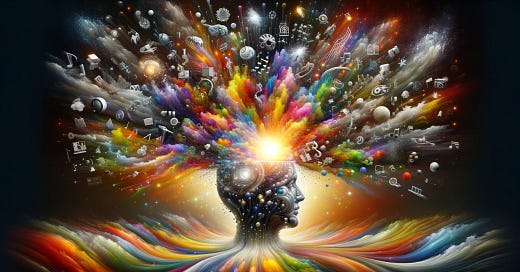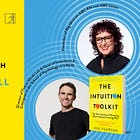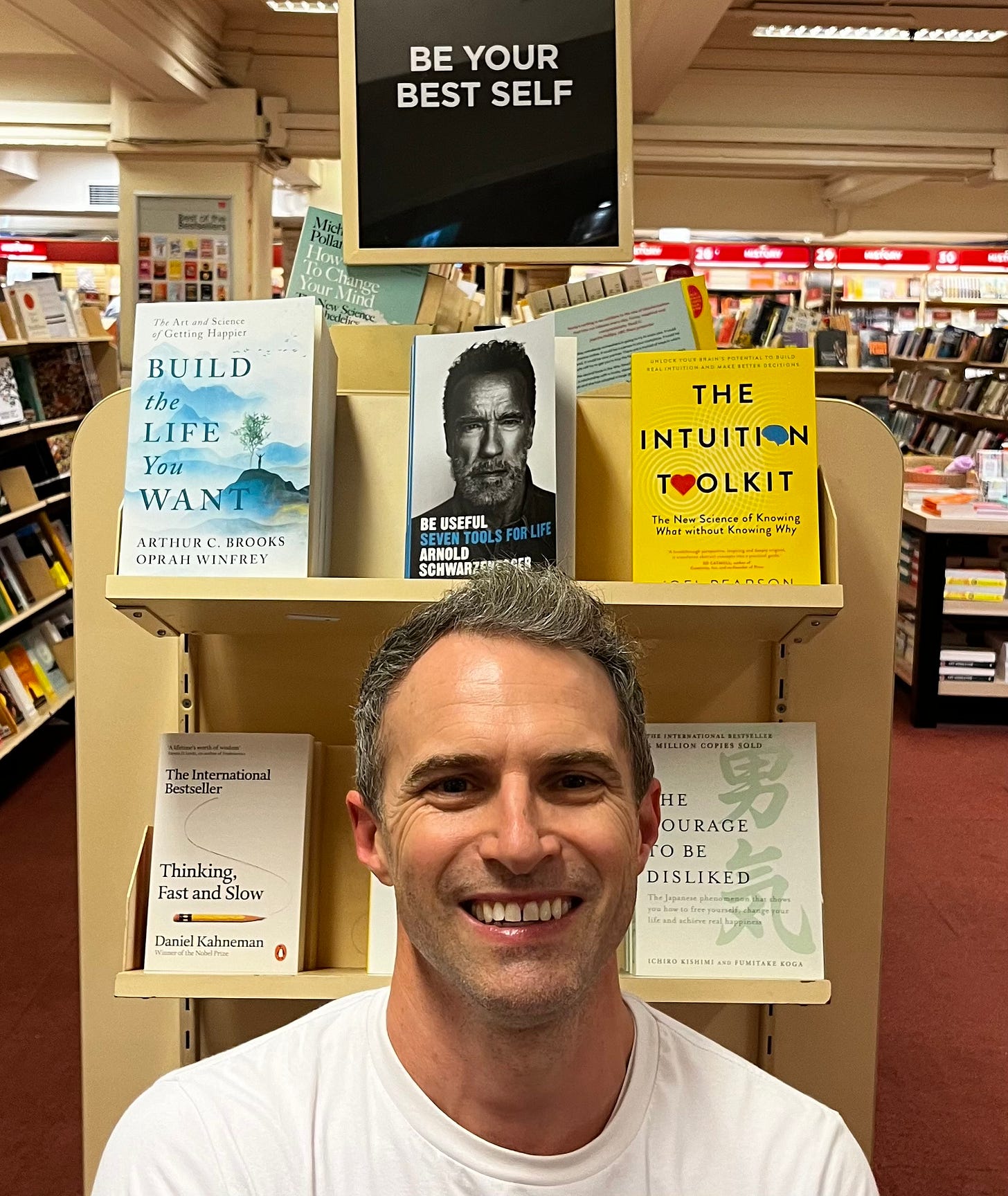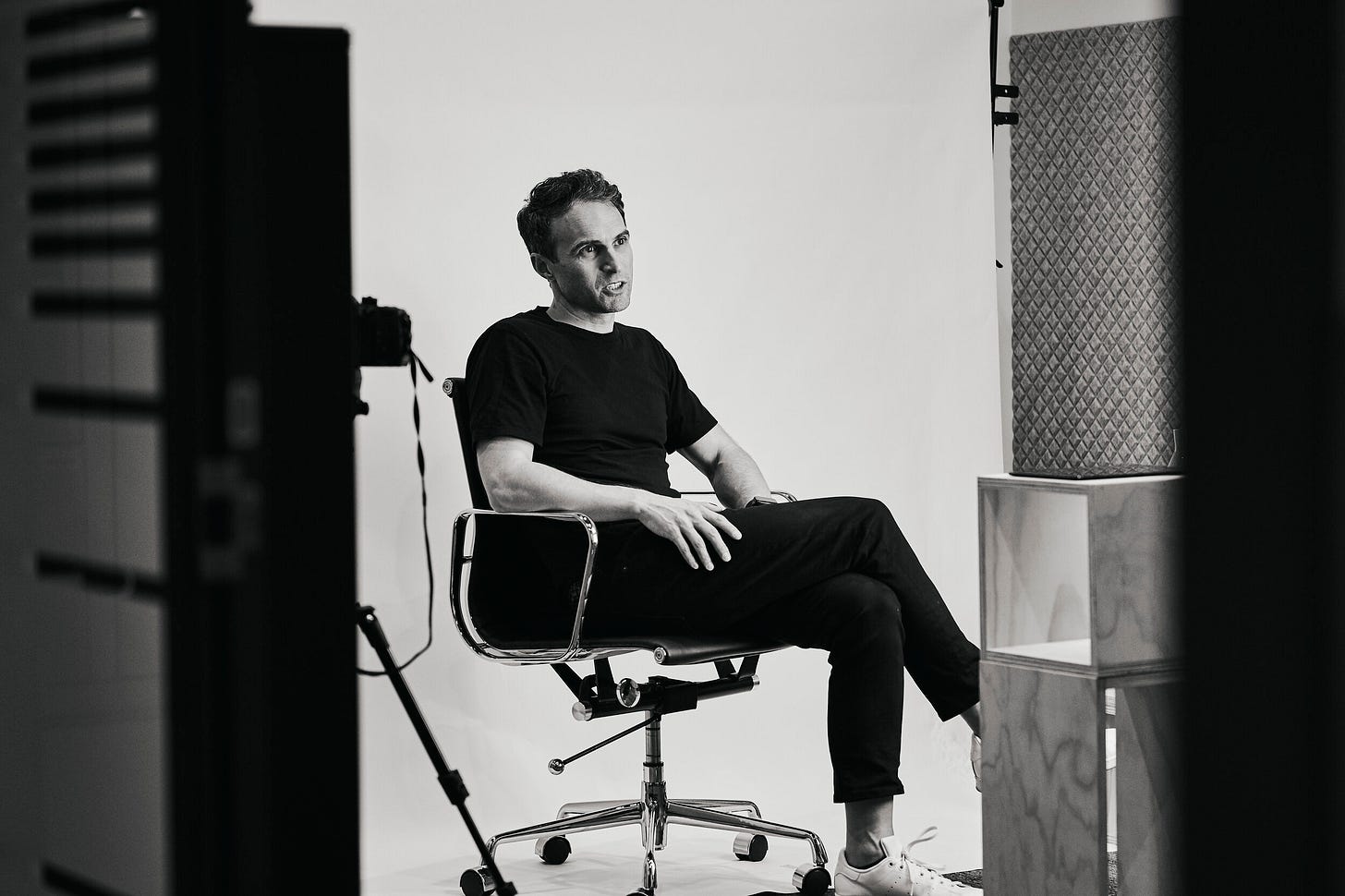New Aphantasia research - Revisiting the blind mind - More objective measurement
Curated, Science-Driven Insights into the Brain.
Future Minds is a weekly newsletter that breaks down the science of the mind and brain into short and easy-to-digest insights and actionable take-homes. So if you are not already a subscriber, sign up and join the many others who receive it directly in their inbox each week or so— it’s free.
Hello, Dear readers!
We're thrilled to reach out to you again, here we go into the fascinating realm of Aphantasia through our latest research findings. As pioneers in this field, our 2018 study broke new ground by establishing Aphantasia as a tangible phenomenon. Building on this, our recent study provides deeper insights, affirming that Aphantasia is not just about lacking visualization, but understanding its broader cognitive implications.
I’m also celebrating the success of my book launch, "The Intuition Toolkit." The reception has been nothing short of amazing, and for those interested in intuition, consciousness, and making better decisions, make sure to check out my TV interview about the book at the end of this newsletter. I’ve had a whirlwind two weeks, doing many bookshop signings in Sydney and Melbourne, radio, TV and lots of podcasts! It’s been amazingly fun and I am filled with gratitude and thanks.
Enjoy!
At a glance:
2018 study confirmed aphantasia as a real condition, identified through binocular rivalry tests (objective rather than subjective), disproving theories of unconscious imagery, but at the time we only had a few individuals that could come into the lab.
Further research shows aphantasia's broader cognitive impacts, establishing it as a distinct condition, not a metacognitive error.
Studies suggest aphantasia influences memory, dreaming, and creativity, highlighting the need for a reevaluation of cognitive diversity.
Discovery of Aphantasia Through Binocular Rivalry
In 2018, we published the first scientific paper to show that aphantasia is a real phenomenon. We showed that aphantasia can be measured objectively and reliably using a visual illusion called binocular rivalry. Why is this important? It was the first study to show that those with aphantasia, those that didn't feel or have conscious imagery when they attempted to imagine, no perceptual representation was formed, as measured by the binocular rivalry illusion. Binocular rivalry is similar to showing one eye an image of a horse and the other an image of a house, where most people would switch between seeing a house and a horse. Those with aphantasia, however, struggle to 'switch' their perception based on prior imagined content, underscoring their unique cognitive processing.
This was groundbreaking in the fact that it provided the first evidence that imagery was, in fact, not there, as opposed to it merely being unconscious or people having different criteria for how to report the vividness of their visual imagery. For example, one person might rate their imagery at zero and another at 4, despite both of them having the same mental image. Here is a link to the actual paper.
The main figure from the new paper. Data shows binocular rivalry priming scores from the 2018 paper for those with aphantasia (left grey-scale violin plot) and general population data (middle pink violin plot). The rightmost teal violin plot shows data from all individuals with aphantasia tested on the binocular rivalry paradigm to date (including those from the 2018 paper). B. Frequency histogram of the bootstrapping analysis from the general population data (you’ll need to read the paper to understand this). C. Violin plots show binocular rivalry data scores for individuals with aphantasia with scores below 32 on the VVIQ (N = 51) split into two groups: VVIQ = 16 (N = 32, left dark purple violin plot) and VVIQ = 17-32 (N =19, right light purple violin plot).
This was groundbreaking in the fact that it provided the first evidence that imagery was, in fact, not there, as opposed to it merely being unconscious or people having different criteria for how to report the vividness of their visual imagery.
Broadening Understanding of Aphantasia's Cognitive Impacts
Building on this foundation, our latest research endeavours to further unravel the complexities of aphantasia, shedding light on its broader cognitive implications and reinforcing the notion that it is not a result of poor metacognition (the awareness and understanding of one's own thought processes). Through a comprehensive analysis involving over fifty participants (we only had 15 in the original 2018 paper), we've delved into the mechanisms of visual processing in individuals with aphantasia, employing both subjective measures like the Vividness of Visual Imagery Questionnaire (VVIQ) and objective assessments such as binocular rivalry responses.
Aphantasia's Influence on Memory, Dreaming, and Creativity
Our findings underscore the genuine inability of individuals with aphantasia to generate voluntary visual imagery, challenging previous assumptions that this might be due to a lack of effort or misinterpretation of mental imagery. This distinction is crucial, as it speaks to the very essence of how people with aphantasia experience and interact with their cognitive processes. Unlike earlier beliefs, our research indicates that aphantasia is not tied to an individual's metacognitive abilities, but is instead a distinct cognitive condition with specific neural underpinnings.
Unlike earlier beliefs, our research indicates that aphantasia is not tied to an individual's metacognitive abilities but is instead a distinct cognitive condition with specific neural underpinnings.
In conclusion, our new research not only reaffirms the existence of aphantasia as a genuine cognitive phenomenon but also enriches our understanding of the human mind's vast and varied landscape. It challenges us to reconsider our assumptions about mental imagery and its impact on cognitive functions, offering a more inclusive perspective on neurodiversity and the complexity of human cognition.
Mental Meanderings
How do you experience dreams with aphantasia? How do you perceive creative processes like painting, and drawing? How do you create the memory of a sunset/sunrise?
In Case You Missed It: discover our past insights…
and here is a link to a great ABC podcast All in The Mind on Intuition and how to use it
The Intuition Toolkit book
Prefer to listen? Try the audiobook read by ME.
I just had to share this image with you all, it made my week!










How do you experience dreams with aphantasia?
When I dream I see things from my own perspective (but I don't dream about things that I have experienced). I can't remember if I have ever dreamed from another perspective than my own eyes. Real sounds in my environment can be incorporated into the dreams, but I am not certain that my dreams have any sounds created by my mind. It definitely don't contain any other sensory perceptions.
How do you perceive creative processes like painting, and drawing?
I just do it. There is no perceived contious thought involved. It is not pretty pictures, they lack details and proper perspective. But you can see what they are suppose to depict.
How do you create the memory of a sunset/sunrise?
Do you voluntarily create memories? Not as far as I know...
If you mean that I saw it in person. Then I just know that I was there (including when and where). Having said that. When I compare my recollection with a former girlfriend that doesn't have Aphantasia, my memory of when something happened a couple of years ago, is often not as precise as her memory of the same event.
Even so, her memory isn't perfect either. If it were not for the fact that she write in a diary, she wouldn't have known that some of her memories is wrong to...
If you on the other hand is refering to knowing what a sunset/sunrise is. Then I would say that it is more like looking up a definition in a dictionary or encyclopedia. It is a short description (with words) of the main characteristics.
I have complete multi-sensory aphantasia, so I can't see images, nor do I hear sounds or experience any other senses mentally. I dream vividly and often, always from my perspective. They're often very weird dreams, and I often don't remember them for very long after awakening. I am terrible at painting and drawing likely because I can't hold an image of anything in my head. I love photography because I get to use what is on hand to create the image and I don't have to do it from scratch. I also enjoy writing, though I don't do it very often lately. I can't remember any sunsets or sunrises visually, but I can remember how watching an amazing one made me feel. I can also remember some by telling you where and when they were. I can't see them or recreate them in any way. I'm very glad that we're finally studying aphantasia.